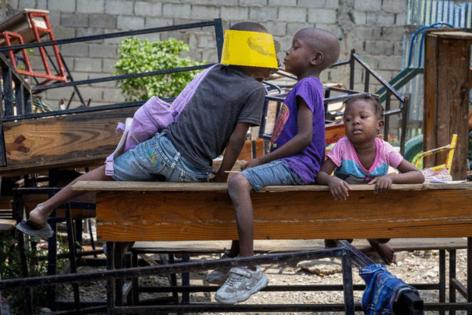Children are being recruited into Haitian armed gangs at an alarming rate, UNICEF says
Published in News & Features
Haiti’s armed-gang crisis just got worse — and even more complicated.
A new report by the United Nations’ leading child welfare agency, UNICEF, says the number of children being recruited by the country’s violent gangs has soared by 70% in the last year.
The unprecedented spike, registered between the second quarter of 2023 and this year, is yet another example of how children in Haiti, already kept out of school due to violence and rape by gangs, are increasingly being robbed of their childhood.
“Children in Haiti are trapped in a vicious cycle — recruited into the very armed groups that are fueling their desperation, and the numbers are growing,” said UNICEF Executive Director Catherine Russell. “This unacceptable trend must be reversed by ensuring children’s safety and welfare are prioritized by all parties.”
As many as half of all members of armed gangs in Haiti are children, the U.N. said. This revelations come as Haiti sees an escalation in violence by armed groups and rising vigilantism by residents desperate to protect their neighborhoods from being overtaken.
A separate report by the Global Initiative Against Transnational Organized Crime says that as the country finds itself trapped between escalating violence and political paralysis, criminal groups are taking advantage of the institutional collapse and political vacuum to expand their territories.
“In a political-institutional vacuum, the gangs have weaponized violence to exert pressure on the system,” the report said.
Last week, dozens of suspected gang leaders were killed by police and residents during an attempt to invade the upscale community of Pétion-Ville in the capital. While police put the official death toll at 28, Haiti’s National Human Rights Defense Network said the actual number killed after police intercepted three vehicles on Tuesday was 90. Overall, at least 108 people were killed over a three-day span of violence involving gangs and communities fighting back.
In one of the photos of the Tuesday incident, the charred body of a young child could be seen in the back of a vehicle. A 43-year-old resident in the Bourdon community of the capital, who spoke to the Miami Herald on condition of anonymity out of fear for his safety, said that among three armed gang members he saw running through the community fleeing police was a boy around 12 years old toting an automatic rifle and wearing flip flops.
“A 12-year-old child with a huge Galil in his hands, that is sad,” said the man, who like most people in the Port-au-Prince neighborhood was awakened by the sounds of gunfire and screams as police attempted to capture the invaders. “These children are the most dangerous.”
A father of three between the ages of 4 and 18, the man said he is still shaken by the site of the heavily armed child, who was lost inside the community and trying to find his way out.
“Children should not be living these kinds of things,” he said, blaming the recruitment of children by armed gangs on the government, which has failed to protect children and for years ignored an epidemic of street kids who have presumably been recruited into the armed groups. “The state has not taken responsibility.”
UNICEF says that the rise in child recruitment by armed groups has been fueled by escalating violence, pervasive poverty, lack of education and near collapse of critical infrastructure and social services in Haiti.
“Children are often coerced into joining to support their families, or under threats to their safety,” the agency said in a statement. “Many are recruited after being separated from their caretakers, stripped of protection and survival options.”
The recruitment of kids, as well as the rape of girls in Haiti by armed gangs, is a grave violation of children’s rights, said UNICEF, calling on Haitian authorities to prioritize the protection of children.
In Port-au-Prince, 1.2 million children live under the threat of armed violence. An estimated 25% of the more than 703,000 internally displaced people — of whom 365,000 are children — are currently in the city living under dire conditions and exposed to multiple threats.
“Children in many parts of Haiti are subjected to atrocities no child should ever have to experience, leaving them with psychological and emotional scars that might haunt them for a lifetime,” Russell said. “Chaos and horror have become part of daily life.”
©2024 Miami Herald. Visit at miamiherald.com. Distributed by Tribune Content Agency, LLC.







Comments